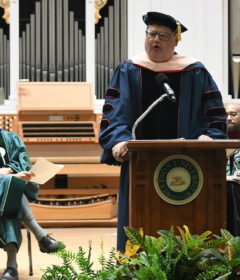Psychology Professor Achieves ‘Once-in-a-Scientific-Lifetime Success’


In his own words, Stetson’s Scott Semenyna, PhD, an assistant professor in the Department of Psychology, achieved the “high-water mark of my scientific career — one I am unlikely to repeat soon (if ever).”
For good measure, he added, the achievement equals a “once-in-a-scientific-lifetime success.”
This fall, Semenyna’s research paper, “Male Androphilia, Fraternal Birth Order, and Female Fecundity in Samoa: A 10-y Retrospective,” was accepted for publication by the Proceedings of the National Academy of Sciences (PNAS). According to one industry-recognized ranking system, PNAS is the sixth-ranked journal in the world. The research paper is the culmination of a collaboration with Semenyna’s mentor and colleagues, and Semenyna was the lead author.
Arriving at Stetson in fall 2022, Semenyna specializes in evolutionary and cultural psychology, centered on the causes and consequences of sex and sexual orientation differences in personality and behavior.
About the Research
In essence, his research paper adds to the ongoing scientific discussion about why some males are same-sex attracted. While other studies come to similar conclusions, his study uses 10 years of fieldwork in Samoa, an island in the South Pacific where women often have more children than in the West.
“One consistent finding is that these males tend to have more older brothers than straight men, called the Fraternal Birth Order Effect,” Semenyna explained. “The leading explanation is that a mother’s immune system reacts to male pregnancies, and this immune reaction can influence later sons’ fetal brain development and sexual orientation. We find evidence for this birth order effect but did not find evidence that mothers of same-sex-attracted males reproduce more, a reproductive effect (of mothers) that has been suggested as an evolutionary explanation for male same-sex attraction.”
The study, Semenyna continued, makes researchers more certain that birth order genuinely impacts male sexual orientation.
“But this was already well established,” he said. “If mothers of same-sex attracted males reproduced more, it might offset the fact that their sons’ attractions have a partial genetic basis, but reduced reproduction. We didn’t find evidence that this was true. So, one prominent evolutionary explanation of male same-sex attraction needs to be re-examined. Some science clarifies our understanding, but this study also highlights complications.
“Birth order is a robust and reliable correlate of male same-sex attraction, but we’re less certain how genes for this trait can be maintained across evolutionary time. We need to refine our ideas, or go back to the drawing board entirely, then collect more data.”
About the Author

Semenyna received a doctorate in Psychology in 2021 from the University of Lethbridge in Alberta, Canada, where he also was a postdoctoral fellow. His interest in sexual orientation grew from longer-standing interests in evolutionary and cultural psychology.
“Sexuality is a central aspect of most people’s lives,” he said. “And cross-cultural research helps scientists discern the threads that unite humanity from the cultural influences that make groups (and individuals) unique. This line of research focuses on how male sexual orientation develops, and how it can be understood in Darwinian terms.”
Other streams of his research focus on ways the romantic landscape is influenced by non-heterosexual people. “Understanding the causes of sexual orientation diversity is a pressing scientific question, but so is understanding the ways this diversity influences society and the social settings we all inhabit,” he commented.
In the end, Semenyna’s research work, now being published in the prestigious PNAS, has quite possibly led to a new beginning for his career.
“Many excellent researchers carve out impactful scientific careers without having papers accepted by these outlets,” he concluded. “There’s more luck in academic publishing than many people realize. I feel exceedingly fortunate in this regard, and the credit really belongs to the many people who have mentored me.”
-Stetson Today



